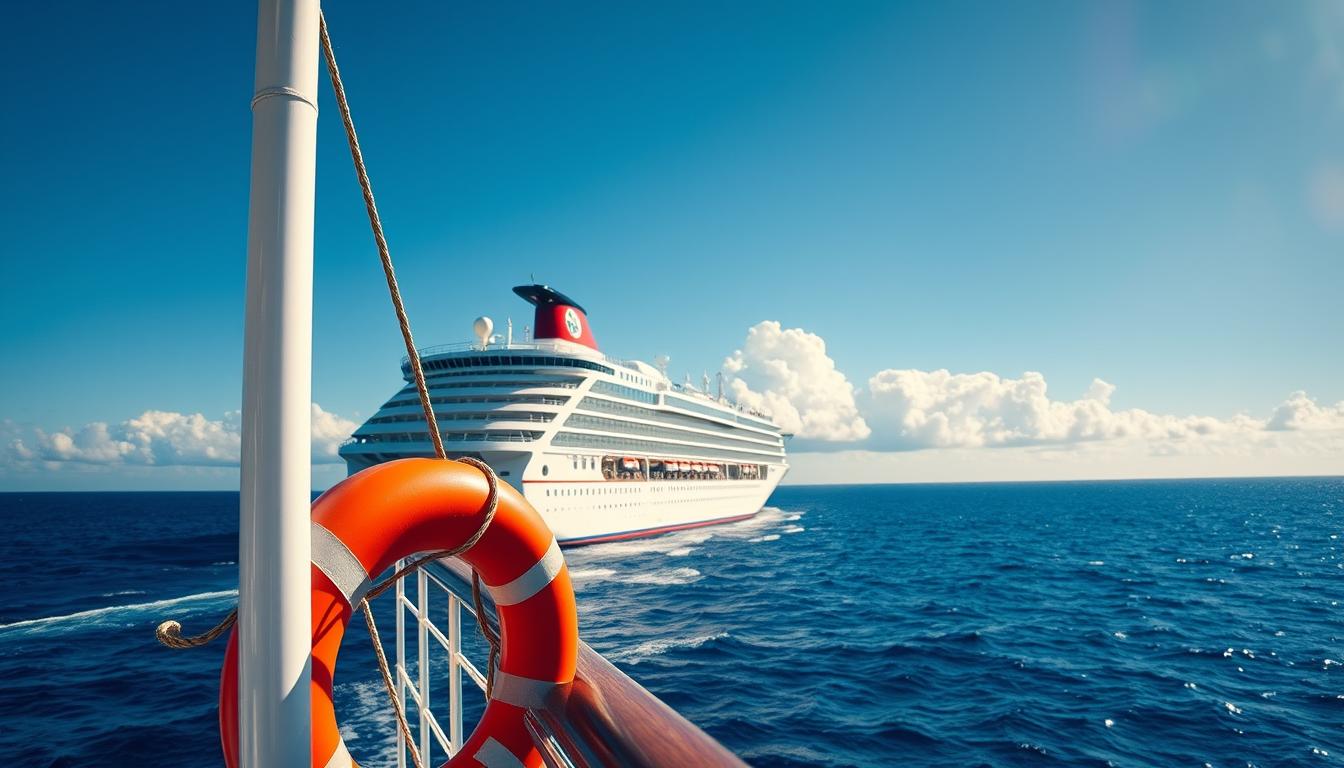Picture this: You’ve booked a dream voyage across crystal-blue waters. But what happens if a storm delays your flight to the departure port? Or if you need urgent medical care mid-journey? Unexpected hiccups can turn paradise into stress without the right safety net.
That’s where specialized coverage comes in. Companies like Allianz offer plans designed for life at sea, covering everything from lost luggage to onboard injuries. Their policies don’t stop at the ship—they protect prepaid hotel stays, shore excursions, and even flight delays that could derail your entire trip.
Think of it as a backup plan for your adventure. Whether it’s a missed connection or a sudden illness, having protection means focusing on sunsets instead of surprise bills. We’ll break down how to choose smart coverage that lets you explore confidently, knowing you’re prepared for whatever the waves bring.
Understanding Cruise Travel Insurance
Imagine boarding a ship only to discover your luggage is stuck in another country. Maritime adventures come with unique risks—rough seas, port cancellations, or even onboard medical needs. Standard plans often leave gaps here, which is why specialized protection matters.
What’s Covered?
Tailored policies handle scenarios regular plans ignore. For example, Travel Guard’s packages include reimbursement for missed port fees or prepaid excursions canceled due to weather. They also cover medical evacuations from remote locations—a critical feature when you’re miles from shore.
Key Differences at a Glance
| Feature | Cruise-Specific Plan | Standard Plan |
|---|---|---|
| Trip Interruption | Up to 150% of trip cost | Up to 100% |
| Medical Evacuation | Includes ship-to-shore transport | Limited to land-based care |
| Missed Port Fees | Reimbursed | Not covered |
Providers like Allianz add layers like emergency cabin confinement benefits if you’re quarantined mid-voyage. These extras turn “what if” worries into manageable details, letting you focus on the horizon instead of paperwork.
Benefits of Having Cruise Travel Insurance
Unexpected events can turn a dream voyage into a stressful situation. That’s where the right coverage steps in, offering a safety net that lets you enjoy every moment. Let’s explore how specialized policies safeguard both your wallet and well-being.
Shield Your Budget from Surprises
Non-refundable deposits add up quickly. If storms or illness force you to cancel, companies like Allianz reimburse prepaid costs—even for shore excursions. For example, a family recouped $5,000 after a hurricane disrupted their Caribbean itinerary. Policies also cover delays, ensuring you’re compensated for missed ports or extra hotel stays.
Stay Protected in Emergencies
Medical care at sea isn’t cheap. Travel Guard’s plans include evacuation by helicopter or boat, with bills often exceeding $100,000 covered. Their 24/7 assistance team arranges care globally, whether you’re docked or miles offshore. One traveler avoided $75,000 in costs after breaking a leg during a snorkeling stop.
| Benefit | Typical Coverage | Real-World Example |
|---|---|---|
| Trip Interruption | Up to 150% of trip cost | Reimbursed $7,200 for a family’s diverted Alaska voyage |
| Emergency Evacuation | Unlimited transport | Covered $92,000 airlift from the Bahamas |
| Medical Expenses | Up to $250,000 | Paid $15,000 for onboard heart monitoring |
Knowing experts handle crises lets you relax. Whether it’s lost luggage or a sudden fever, your focus stays on making memories—not managing mishaps.
Key Features of Cruise Travel Insurance Plans
Ever had a vacation turn sideways? The right coverage keeps surprises from sinking your plans. These policies bundle essential safeguards, balancing emergency support with practical reimbursements. Let’s unpack what makes them indispensable for smooth voyages.
Medical Expense and Trip Cancellation Coverage
High-limit medical protection is vital when care costs soar at sea. For example, Allianz offers up to $250,000 for emergencies—enough to cover airlifts or hospital stays. Trip cancellation benefits also refund non-refundable deposits if hurricanes or illnesses force last-minute changes. One family recovered $8,500 after a positive COVID test grounded their departure.
Travel Delay and Baggage Protection
Delays cost more than time. Policies like Travel Guard’s reimburse up to $2,000 for meals and lodging during unexpected waits. Lost luggage? You’ll get $1,500 to replace essentials while the airline investigates. A traveler once received $800 within 48 hours after their snorkel gear vanished mid-voyage.
| Coverage Type | Typical Limit | Real-World Use |
|---|---|---|
| Medical Expenses | $250,000 | Covered emergency surgery during transatlantic crossing |
| Trip Cancellation | 100% of trip cost | Refunded $6,200 for last-minute family emergency |
| Baggage Loss | $1,500 | Replaced stolen camera gear in the Bahamas |
| Travel Delay | $2,000 | Paid for 3-night hotel stay during port closure |
Some plans go further with Adventure Sports Bundles, protecting activities like scuba diving or zip-lining. Whether it’s a missed port or misplaced suitcase, these layers ensure you’re covered from cabin to coastline.
Important Coverage Aspects and Optional Add-ons
What if your dream itinerary suddenly shifts? Optional upgrades let you build coverage that matches your voyage’s unique rhythm. Think of them as customizable shields—extra layers that adapt to your adventures and anxieties.
Adventure Sports Bundle Options
Active explorers need specialized protection. Travel Guard’s add-on covers activities like scuba diving or zip-lining—common on Caribbean voyages but often excluded from standard plans. Their bundle includes up to $50,000 for equipment loss or emergency evacuations during high-risk excursions.
One traveler used this to claim $3,200 after waves damaged their snorkeling gear. Without it, they’d have paid out-of-pocket. These bundles turn “no” scenarios into covered moments, letting adrenaline seekers focus on thrills.
Cancel for Any Reason Benefits
Life’s unpredictable. This upgrade reimburses 50-75% of non-refundable trip costs, even if you cancel two days before departure. Compare that to basic plans, which only cover specific reasons like illness or storms.
A family recouped 70% of their $6,000 voyage after a last-minute work conflict. While pricier, this flexibility eases decision stress. It’s peace of mind for planners who value control over rigid schedules.
Smart travelers weigh add-on costs against potential savings. A $100 upgrade might save thousands if ports close or luggage vanishes. Match extras to your itinerary’s risks—because the best plans grow with your journey’s twists.
Choosing the Right Cruise Travel Insurance: A Buyer’s Guide
How do you pick the perfect safety net for your voyage? Start by comparing apples to apples. Coverage limits vary wildly—some plans offer $250,000 for medical emergencies, while others cap at $50,000. Always match these numbers to your itinerary’s risks.

Next, dig into optional add-ons. Travel Guard’s customizable policies let you bundle adventure sports protection or “cancel for any reason” upgrades. One couple added hurricane coverage for their Bahamas trip and avoided $4,200 in losses when storms rerouted their ship.
Follow this three-step checklist:
- Get quotes early—many providers like Squaremouth lock in pre-existing condition waivers if you buy within 14 days of booking
- Compare deductibles side-by-side (look for plans under $100)
- Read customer reviews focusing on claim response times
| Provider | Medical Coverage | 24/7 Assistance | Add-On Options |
|---|---|---|---|
| Travel Guard | $250,000 | Yes | Adventure, Weather |
| Squaremouth | $500,000 | Yes | CFAR, Electronics |
Don’t just chase the lowest price. A family learned this when their budget plan denied a $8,000 claim for missed ports—the policy lacked “trip interruption” wording. Balance cost with service quality, and you’ll sail smoother.
Comparing Third-Party vs. Cruise Line Insurance Options
Ever wondered who’s got your back when plans go overboard? Let’s unpack the key differences between policies sold by cruise operators and independent providers. While both offer safeguards, their approaches vary widely in flexibility and financial protection.
Benefits of Third-Party Plans
Independent providers like Travel Guard deliver broader shields at competitive rates. Their plans typically cover:
- Flight cancellations (even non-refundable tickets)
- Prepaid hotel stays and excursions
- Medical evacuation up to $500,000
One traveler recovered $15,000 for emergency surgery using a third-party policy—cruise line coverage capped similar claims at $10,000. Custom add-ons like Cancel For Any Reason (CFAR) let you tailor protection to your itinerary’s risks.
Limitations of Cruise Line Offerings
Ship-sold policies often focus narrowly on voyage-specific issues. Key gaps include:
- No reimbursement for flight delays unrelated to the cruise
- Lower medical expense limits (average $25,000 vs. $250,000)
- Restricted adventure activity coverage
A family learned this when their cruise policy denied $2,000 in airfare losses after missing embarkation. Third-party alternatives would’ve covered those costs plus provided $300/day for delay expenses.
| Feature | Third-Party Plan | Cruise Line Plan |
|---|---|---|
| Trip Cancellation | 100% refund + CFAR options | 75% refund, strict criteria |
| Medical Evacuation | $500,000 average | $25,000 average |
| Adventure Sports | Optional add-on | Rarely covered |
Smart travelers often lean on third-party specialists for robust protection. While cruise policies simplify purchases, independent plans adapt to your journey’s unique needs—from missed flights to zip-lining injuries.
Cost Considerations and Value for Money
How much should you invest in peace of mind? Maritime journeys often involve complex logistics, making smart budgeting essential. Let’s navigate pricing structures and hidden perks that maximize your protection without overspending.
Average Pricing and Coverage Limits
Policies typically cost 4-10% of your total voyage price. Squaremouth reports daily averages around $37, with 7-day plans averaging $220-$300. Higher-tier options might cost 15% more but double medical limits or add adventure activity coverage.
For example, a $5,000 voyage could warrant $400-$600 in protection. One traveler spent $550 on a plan with $500/day delay reimbursement—then claimed $1,200 during a 3-day port closure. Matching limits to your itinerary’s risks ensures you’re not underinsured.
| Coverage Tier | Average Cost | Key Benefits |
|---|---|---|
| Basic | $150 | $50k medical, trip cancellation |
| Plus | $220 | $100k medical, baggage delay |
| Premium | $300 | $250k medical, CFAR upgrade |
Evaluating Non-Refundable Trip Costs
Protect what you can’t afford to lose. If 60% of your expenses are non-refundable—like prepaid excursions or flights—coverage becomes critical. A family saved $4,800 after insuring their $8,000 voyage when a hurricane canceled departure.
Delay benefits also matter. Look for plans offering $250+ per day for unexpected hotel stays or meals. One couple received $900 during a 2-day flight reroute, turning frustration into manageable downtime.
Balance costs by comparing deductibles and claim success rates. A $50 premium difference could mean $5,000 in extra protection—worth skipping two onboard cocktails for guaranteed security.
Tailoring Your Insurance to Your Unique Travel Needs
Your voyage should reflect your personality—not a one-size-fits-all safety net. Customizing your plan ensures protection aligns with your health history and itinerary’s risks. Let’s explore how to build coverage that moves with you, wave by wave.
International Health and Emergency Needs
Exploring distant shores? Verify your policy includes global care networks. Travel Guard’s enhanced services connect you with vetted hospitals in 150+ countries. A traveler in Greece avoided $28,000 in bills when their plan covered airlifting to Athens for appendicitis surgery.
Look for these features:
- Shipboard medical care (some policies exclude onboard clinics)
- 24/7 multilingual support for translating prescriptions
- Evacuation to preferred hospitals back home
| Coverage Aspect | Basic Plan | Enhanced Plan |
|---|---|---|
| Medical Evacuation | $100,000 | $500,000 |
| International Hospital Access | Limited network | 500+ facilities |
| Telemedicine Consultations | 3 sessions | Unlimited |
Pre-Existing Conditions and Waiver Options
Don’t let past health issues sink your plans. Many providers require purchasing within 14 days of booking to qualify for pre-existing condition waivers. Travel Guard’s waiver covers flare-ups if you meet deadlines and disclose medications upfront.
A couple avoided $12,000 in cancellation fees when the husband’s diabetes complications arose. Their timely enrollment ensured full reimbursement. Always review:
- Stability periods (typically 60-180 days before travel)
- Required medical documentation
- Upgrade costs for comprehensive waivers
When and How to Purchase Your Cruise Insurance
Timing is everything when protecting your voyage. Locking in coverage early maximizes benefits while simplifying your journey. Let’s map out the smartest path to secure your safety net.
Optimal Timing and Early Purchase Benefits
Buy within 14 days of booking to unlock critical perks. Providers like Allianz waive pre-existing condition exclusions if you meet this window. Early shoppers also access discounts—up to 10% off with Travel Guard’s advance plans.
Waiting risks coverage gaps. For example, policies won’t reimburse delays or cancellations that occur before purchase. One family saved $3,500 by insuring their trip the same day they booked flights.
Steps to Get a Quote and Finalize Your Plan
Start online for instant comparisons. Squaremouth’s tool lets you filter by:
- Trip cost and destination
- Desired medical limits
- Preferred add-ons like weather protection
| Provider | Quote Process | Key Early-Bird Perk |
|---|---|---|
| Travel Guard | 3-minute online form | Pre-existing waiver in 14 days |
| Squaremouth | Multi-company comparison | CFAR eligibility if purchased early |
Review policy details thoroughly before confirming. Check coverage for flights, prepaid excursions, and emergency evacuation limits. Most plans activate within 24 hours—finalize at least a month before setting sail.
Conclusion
Your journey deserves a safety net as unique as your itinerary. Specialized plans shield non-refundable deposits, medical emergencies, and last-minute changes—turning potential disasters into manageable hiccups. Third-party options often deliver broader protection than cruise line policies, covering flights and prepaid excursions that ship-sold plans might ignore.
Act early. Locking in coverage within 14 days of booking unlocks critical perks like pre-existing condition waivers. Compare providers like Allianz and Travel Guard side-by-side, focusing on medical limits and 24/7 support. One family avoided $7,200 in losses this way when their Alaskan voyage rerouted unexpectedly.
Ready to explore confidently? Get quotes from trusted sources and prioritize customer service over bargain rates. A well-chosen plan doesn’t just guard your budget—it gifts you peace of mind. Because the best adventures happen when you’re free to enjoy the horizon, not fret over “what ifs.”
FAQ
How does cruise coverage differ from regular travel protection?
Will this cover me if I need a helicopter evacuation?
Are snorkeling or zip-lining excursions protected?
Should I buy through the cruise line or independently?
How soon after booking should I get insured?
What if my flight delay makes me miss embarkation?
FAQ
How does cruise coverage differ from regular travel protection?
Unlike standard plans, specialized marine policies include unique protections like emergency evacuation from remote ports, missed port fees, and onboard medical limitations. They’re built for scenarios you’d never face on land vacations.
Will this cover me if I need a helicopter evacuation?
Most quality plans include emergency medical transportation – even airlifts – if local facilities can’t treat your condition. Always verify evacuation limits (often 0K+) match your cruise’s locations.
Are snorkeling or zip-lining excursions protected?
Only if you add an adventure sports bundle. Basic plans often exclude these activities. Check if your itinerary’s excursions require special add-ons before sailing.
Should I buy through the cruise line or independently?
Third-party providers like Allianz or Travel Guard typically offer stronger medical coverage and “cancel for any reason” upgrades. Cruise line policies often lack port abandonment coverage but simplify claims processing.
How soon after booking should I get insured?
Purchase within 14-21 days of your first payment to lock in pre-existing condition waivers and maximize cancellation reasons. Waiting risks losing key benefits.
What if my flight delay makes me miss embarkation?
Robust plans reimburse last-minute transportation costs to catch your ship at the next port, plus cover unused cruise days. Look for
FAQ
How does cruise coverage differ from regular travel protection?
Unlike standard plans, specialized marine policies include unique protections like emergency evacuation from remote ports, missed port fees, and onboard medical limitations. They’re built for scenarios you’d never face on land vacations.
Will this cover me if I need a helicopter evacuation?
Most quality plans include emergency medical transportation – even airlifts – if local facilities can’t treat your condition. Always verify evacuation limits (often $250K+) match your cruise’s locations.
Are snorkeling or zip-lining excursions protected?
Only if you add an adventure sports bundle. Basic plans often exclude these activities. Check if your itinerary’s excursions require special add-ons before sailing.
Should I buy through the cruise line or independently?
Third-party providers like Allianz or Travel Guard typically offer stronger medical coverage and “cancel for any reason” upgrades. Cruise line policies often lack port abandonment coverage but simplify claims processing.
How soon after booking should I get insured?
Purchase within 14-21 days of your first payment to lock in pre-existing condition waivers and maximize cancellation reasons. Waiting risks losing key benefits.
What if my flight delay makes me miss embarkation?
Robust plans reimburse last-minute transportation costs to catch your ship at the next port, plus cover unused cruise days. Look for $1,000+ in travel delay benefits per person.
Does it matter if I’m sailing to multiple countries?
Absolutely. Global medical networks like Seven Corners prioritize policies with international hospital partnerships. Verify your plan’s provider network matches your itinerary’s destinations.
Can I insure non-refundable spa packages or shore tours?
Yes, if you itemize them when purchasing. Most plans cover prepaid experiences if you cancel for covered reasons. Keep all booking receipts for claims.
,000+ in travel delay benefits per person.
Does it matter if I’m sailing to multiple countries?
Absolutely. Global medical networks like Seven Corners prioritize policies with international hospital partnerships. Verify your plan’s provider network matches your itinerary’s destinations.
Can I insure non-refundable spa packages or shore tours?
Yes, if you itemize them when purchasing. Most plans cover prepaid experiences if you cancel for covered reasons. Keep all booking receipts for claims.


